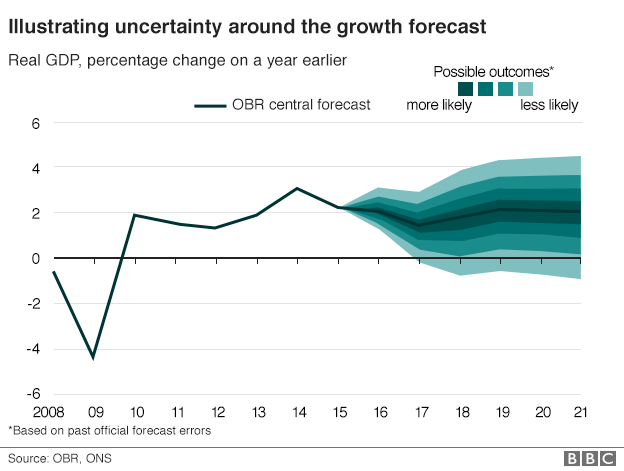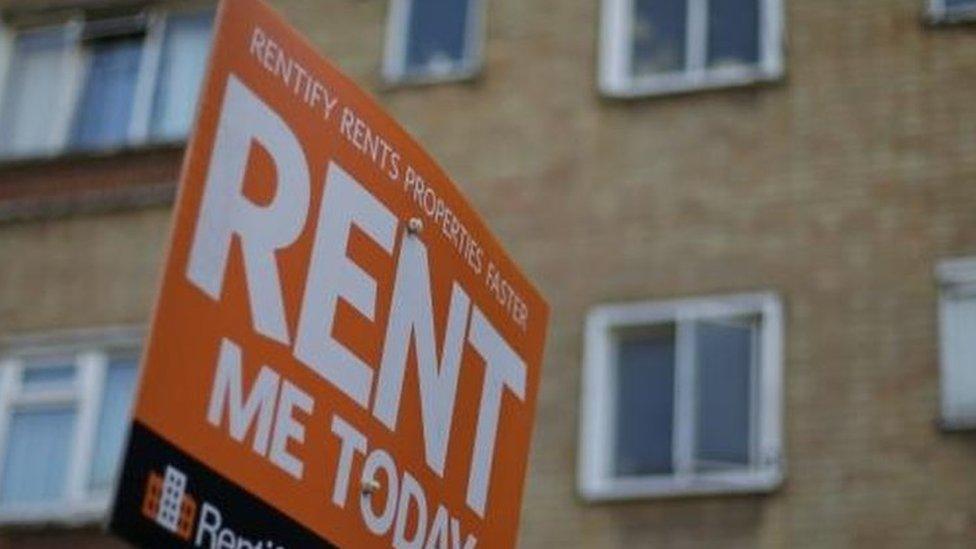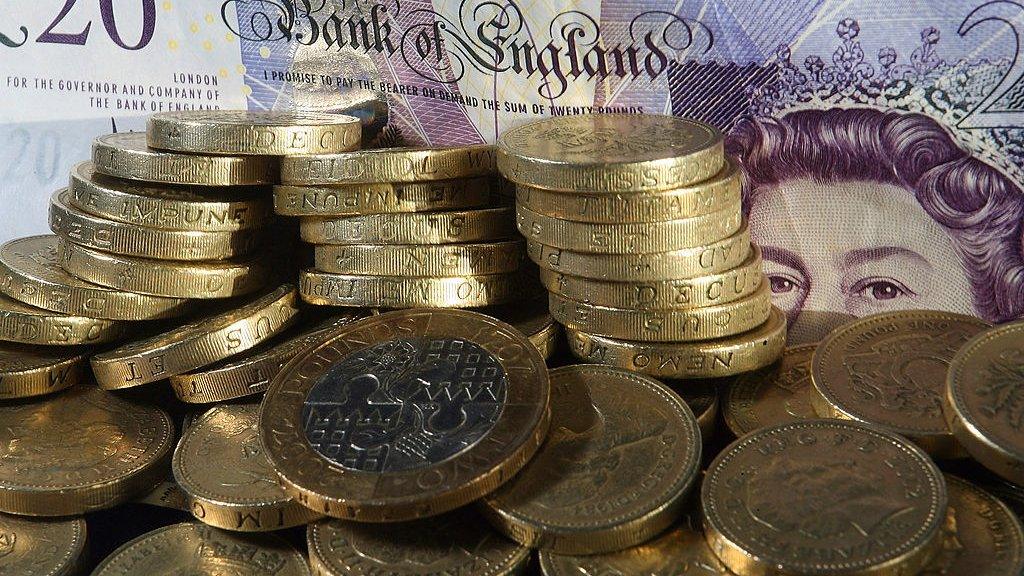Autumn Statement: Hammond defends post-Brexit economy forecasts
- Published
Philip Hammond opened his Autumn Statement by looking at the UK economic figures.
Chancellor Philip Hammond has called economic forecasts in the Autumn Statement one of a "range of outcomes" after some pro-Brexit MPs criticised them for being too pessimistic.
The Office for Budget Responsibility (OBR) forecast more government borrowing and reductions in economic growth after the referendum.
Ex-minister Iain Duncan Smith accused the OBR of "utter doom and gloom".
But Mr Chancellor Hammond said it was good to prepare for a "rainy day".
He added that the government was investing to boost infrastructure and economic productivity and there was a "downward path in borrowing".
BBC economics editor Kamal Ahmed said the chancellor "hopes that the forecasts do prove very gloomy" and he was "setting a bottom line from which he hopes the government can clamber upwards".
During Wednesday's Autumn Statement, Mr Hammond's first since becoming chancellor, he told MPs the UK's deficit would no longer be cleared by 2020.
And the OBR estimated the government would have to borrow £122bn more than forecast in March's Budget, with the referendum result accounting for £58.7bn of this.
Philip Hammond tells Radio 4's Today programme there is uncertainty about the forecasts
The Brexit vote meant potential growth in the current Parliament would be 2.4% lower than forecast in March, according to the OBR who also admitted producing a forecast was "far from straightforward", external, as it had not been given any extra information from the government about its negotiation plans.
It said: "We have made a judgement - consistent with most external studies - that over the time horizon of our forecast any likely Brexit outcome would lead to lower trade flows, lower investment and lower net inward migration than we would otherwise have seen, and hence lower potential output."
The organisation said the economy would be affected by future choices that the government makes about regulatory and other policies and it "could move in either a growth-enhancing or a growth-impeding direction".

Asked about the OBR's predictions, the former Work and Pensions Secretary and Leave campaigner Mr Duncan Smith told the Daily Telegraph it was "another utter doom and gloom scenario" from the organisation.
The Economists for Brexit group predicted more "humiliating U-turns" from the OBR, saying it had "assumed a pessimistic outlook for the UK economy outside the EU, based on bad economic policy-making".
Shadow Chancellor John McDonnell tells Radio 4's Today Labour would tax differently
Conservative MP John Redwood, who also supported Brexit, added: "Their [GDP growth] forecast probably is too low, their borrowing forecast is far too high, and we'll get good access to the single market once we're out of the EU."
But Downing Street dismissed the criticism, saying the OBR's role was to "provide transparency and credibility".
She added: "They are an independent forecaster. We won't get into second guessing them."
In his statement, Mr Hammond promised to invest £23bn on "innovation and infrastructure" over the next five years, with more money for roads, broadband and regional development.
He told BBC Radio 4's Today programme: "There's a downward path in borrowing. We need to keep the downward path on borrowing... But we also need to invest in our economy, to generate the revenue that will drive down the debt."
'Strong foundation'
Describing economic forecasting as "not a precise science", Mr Hammond said of the OBR's forecast: "We should think of it as one of the possible range of outcomes we need to plan for."
He added: "We have a very strong foundation on which to build."
Mr Hammond also said: "We should have a plan which both invests in our economy and puts a little aside for the possibility of a slightly more rainy day next year or the year after."
Uncertainty was "not just about" Brexit but the change of US government when Donald Trump takes office and the growth rate of the Chinese economy, he added.
Labour said the Autumn Statement offered no hope for the future after six "wasted" years.
Among Mr Hammond's announcements were:
Reducing the rate at which benefits are withdrawn from people when they start work
A rise in insurance premium tax which is expected to increase the cost of policies
Increasing the National Living Wage to £7.50 an hour from April 2017
New spending on housing projects totalling £3.7bn in England
Cancelling the fuel duty increase for the seventh year running
£60m a year for grammar school expansion
The speech also triggered questions about the future of the so-called "triple lock" protection for state pensions, while campaigners criticised the lack of extra funding for social care.
The triple-lock guarantees that state pensions rise by the same as average earnings, the consumer price index, or 2.5%, whichever is the highest.
Mr Hammond said the government would meet this pledge, adding: "But as we look ahead to the next Parliament, we will need to ensure we tackle the challenges of rising longevity and fiscal sustainability."
Former work and pensions secretary Stephen Crabb backed a review of the mechanism after 2020.
He told the BBC: "The fiscal impact of the triple lock is not something anyone can dismiss lightly and if we are serious about ensuring that our welfare system remains affordable in the very long term then my own view is that the triple lock has served its purpose and probably needs to get amended, to ensure that we don't have to keep going back to working age families and squeezing the same people's incomes time and again."
Meanwhile health and social care leaders have condemned the statement for a "missed opportunity" to announce new investment.
Key points from the chancellor's first Autumn Statement
For Labour, shadow chancellor John McDonnell told BBC One's Breakfast that although he welcomed the government "moving on investment policy" there had been "mismanagement of the economy over the last six years".
"I find it extremely worrying that they've used the last six years with austerity measures and instead of investing they've been cutting, and as a result of that they're unprepared and ill-equipped for Brexit."
The SNP said Mr Hammond had offered little on Brexit, which it called the "elephant in the room".
Liberal Democrat leader Tim Farron said: "The government's mishandling of Brexit is hitting those on lower and middle incomes the hardest."
He added that "rhetoric" about helping those "just about managing" had not resulted in action, creating "surprising and massive disappointment".
But UKIP said billions were being wasted by the government "delaying" the UK's exit from the EU.
Plaid Cymru said there was little in the statement to help rebuild the Welsh economy and close the wage gap with England.

What questions do you have about the Autumn Statement?
If you are reading this page on the BBC News app, you will need to visit the mobile version of the BBC website to submit your question.
- Published23 November 2016
- Published23 November 2016

- Published22 November 2016
- Published23 November 2016
